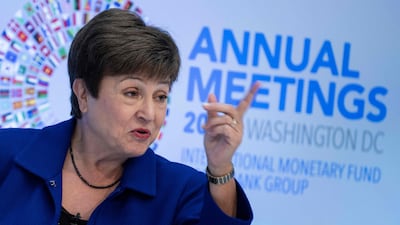International Monetary Fund managing director Kristalina Georgieva warned on Thursday that the world could be in for a decade of sluggish growth unless central banks restore price stability and global leaders address issues of fragmentation and debt distress, as the fight against inflation continues.
Previewing next week's IMF and World Bank Spring Meetings in Washington, Ms Georgieva said in remarks to the Atlantic Council that strong economic growth in the US and emerging markets probably indicates a “marginally stronger” economic outlook in 2024, following a year in which much of the world avoided a recession.
“It is tempting to breathe a sigh of relief … but there are still plenty of things to worry about,” she said in prepared remarks.
“The sobering reality is global activity is weak by historical standards and prospects for growth have been slowing since the global financial crisis. Inflation is not fully defeated. Fiscal buffers have been depleted. And debt is up, posing a major challenge to public finances in many countries.”
The IMF's medium-term outlook for global growth is expected to sit slightly above 3 per cent due to a significant slowdown in production activity.
“Without a course correction, we are indeed heading for ‘the Tepid Twenties’ – a sluggish and disappointing decade,” Ms Georgieva said.
Ms Georgieva also called for leaders to incorporate policies that would invigorate growth, such as improving access to capital and encouraging economic transformation to accelerate the transition to green and digital economies.
An uneven path to price stability
The IMF's updated world economic outlook next week will show progress in the fight against inflation, but it will also show that central banks have more work to do to restore price stability, Ms Georgieva said.
The IMF leader noted inflation has dropped to 2.3 per cent for advanced economies and 4.1 per cent for emerging markets.
The fund increased the world's soft landing prospects earlier this year, but recent US inflation data has shown that such a scenario is not guaranteed.
The Federal Reserve, which sets monetary policy guidelines for the US, has so far resisted political pressure to dial back its restrictive stance after pushing interest rates to a 23-year high.
Ms Georgieva said central banks in major economies – such as the Federal Reserve Board – must avoid political pressure in a year in which much of the world will vote for their government leaders.
“On this final stretch, it is doubly important that central banks uphold their independence. As we know, policy credibility is vital in the fight to restore price stability,” she said.
The IMF has previously projected a slow and uneven process to restore price stability after supply chain bottlenecks caused by the Covid-19 pandemic saw inflation spike around the world.
The world has lost roughly $3.3 trillion in global output since 2020, with vulnerable countries most affected.
“The scares of the pandemic are still with us,” she said.
And economic gains in the recovery since the pandemic are not being felt evenly, as the US economy grew by 2.5 per cent last year compared to slower growth in the eurozone.
“But the most striking divergence is for low-income countries for whom scarring has been the most severe. Among these nations, fragile and conflict-affected economies are bearing the heaviest burden,” Ms Georgieva said.
Georgieva calls for addressing debt distress
Ms Georgieva also called for continued action on improving the restructuring process to prevent low-income countries from falling into debt distress.
Rising debts began long before the Covid-19 pandemic, as low-income countries borrowed during a time when world economies had extremely low interest rates. But those debt levels have since soared due to central banks' response to fighting inflation.
In this new period of higher interest rates, Ms Georgieva said low-income countries experiencing debt burdens face an even more serious crisis.
“For some, delay is simply not an option: consolidation must start now to avoid tipping into debt distress” she said.
Ms Georgieva said the IMF's global sovereign round-table will convene next week to create clear timelines for debt restructuring and provide clarity on “comparability of treatment” among different creditor groups.


